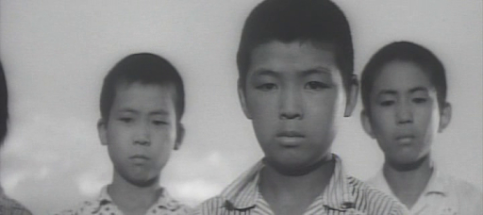Obscure Japanese Film #53
Director Miyoji Ieki (1911-76) made something of a speciality out of films focusing on children; this film, along with Stepbrothers (1957) and The Wayside Pebble (1964), certainly suggests that he had a genuine affinity for the subject and is another sensitive portrayal of the trials and tribulations experienced by those in their formative years. In this case, the children are evacuees suffering from homesickness and hunger in the final days of the war.
Like fellow director Satsuo Yamamoto, Ieki was fired by a major studio in the late 1940s due to his left-wing sympathies and subsequently forced to rely on a combination of independent production and freelancing in order to continue his career. All My Children is an example of the former, which may be one reason for the lack of big names among the cast. However, Hitomi Nakahara (b.1936) was a star who had been under contract to Toei since her debut in 1954 and was here appearing in one of her final film roles for many years before switching to TV in 1964. As the children’s teacher, she has a doe-eyed, Audrey Hepburn-like quality that’s quite appealing. She’s the closest thing to a main character in the film – really it’s an ensemble piece with no plot to speak of. Instead, we have an episodic narrative which encompasses everything from a double suicide to a desperate second evacuation to a mountain village, but it holds the interest throughout thanks to Ieki’s excellent staging and attention to detail.
 |
| Hitomi Nakahara |
I suspect that this film provides a pretty accurate portrayal of what it must have been like for such children and their teachers at the time, especially as the screenplay by former Kurosawa collaborator Keinosuke Uekasa (One Wonderful Sunday, Drunken Angel) was ‘based on the Gekkohara Elementary School volume of A Record of School Children Evacuations’. Indeed, several moments called to mind Tatsuya Nakadai’s description of his wartime childhood, such as the fact that the children were so hungry that they resorted to eating toothpaste while, early on in the film, we see them being trained how to kill American soldiers with bamboo spears. All My Children provides a sobering spectacle in showing us the extent to which the right-wing military had gained control of the country and been largely successful in brainwashing the citizens, costing countless innocent lives and almost destroying the country in the process. The film avoids cheap sentimentality for the most part and, just when it threatens to end on a maudlin note, Ieki deftly subverts our expectations with a final scene in which the resilience of the children provides a lesson for their teachers.
Finally, the music: Sei Ikeno’s harpsichord soundtrack may be an odd choice, but it works better than you might expect.

No comments:
Post a Comment